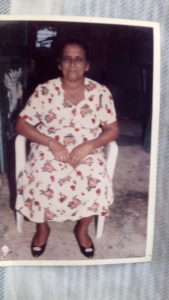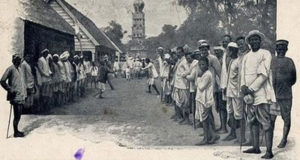 God could not be everywhere, and therefore he made mothers…today as we celebrate.
God could not be everywhere, and therefore he made mothers…today as we celebrate.
Born to Jaso and Totaram Soorjie on the 7th of October 1942 in the humble village of Columbia on the Essequibo Coast was a darling baby daughter. She was the fourth child and was so sweet that her Ajee (father’s mother) called her Rose and that was the name given to her. Rosy Soorgie had to leave school when she was only twelve years-old to join her parents in the rice fields to help maintain the family which quickly grew to sixteen persons, including her parents.
At age 17, on the 19th of March 1960, she was married in a matched wedding to Manoo Bissessar of plantation Hampton Court. By her second Sunday she was back in the rice fields with her husband and in laws, but this time it was not easy for her because her in laws were cultivating over one hundred acres of rice land. She woke up at about three o’clock every morning to cook over sixty roti for breakfast and made lunch to take to the back dam for the very big family of close to thirty; in those days everyone lived toget
her and some had to sleep on the floor with mattresses made out of dried rice straw.
The men ploughed the land with bulls while the others, including the women and children in the family, helped to clear the land of weeds, planted the rice, dug drains, cut the ripe grains with grass knives, and helped to take the straw to the thatched house where the men used the bulls to separate the grains from the straw. The paddy was then taken to the rice mill for sale.
Mrs Soorgie also remembers staying in the “back dams” sometimes for over three months to take care of the family plantation and while there, she would help to milk the cows and sell the milk. Life wasn’t easy, she recalled, but that was the culture then and although it was very hard, she now views the experience as “good in a way to keep the body fit”. It also fostered a sense of closeness with the relatives sharing the same home. After living with her in laws for twelve years, the couple bought a property at lot 72 Hampton Court from her husband’s grandmother for three hundred dollars; this is the same home where Rosy now lives with her son, Gopie and daughter-in- law Baby.
After the death of her husband on the 17th of August 1992, the woman related that she continued to “work hard” to give her four sons and daughter the best of everything she could afford.
She remembers well, when the Sankars bought the Hampton Court Estate from

the Mc Dooms and transformed the village into a modernised one, with a modern Rice Factory, Air strip, modern machinery for rice cultivation, a modernised drainage system and all weather farm roads, thereby creating jobs for hundreds . Eventually the entire rice industry was transformed; farmers had moved from cultivating from twenty bags to fifty bags per acre. “Thanks to the Sankars who eventually take us out of the mud,” she stated.
“To be a mother is a god given role and my only wish this mother’s day is that all mothers lived by example, for you is your child’s first teacher and role model. Always remember what you put in, that will come out,” Rosy reminded. She also used the opportunity to remind all parents to be good examples for their children, so that every day will be mother’s day.
New Arrivals: Loading for Venezuela; Rice Harvest; and Plantation life (Photo courtesy General-Secretary of RPA, late Mr. Pariag Sukhai) (Guyana Times Sunday Magazine)



